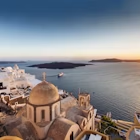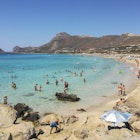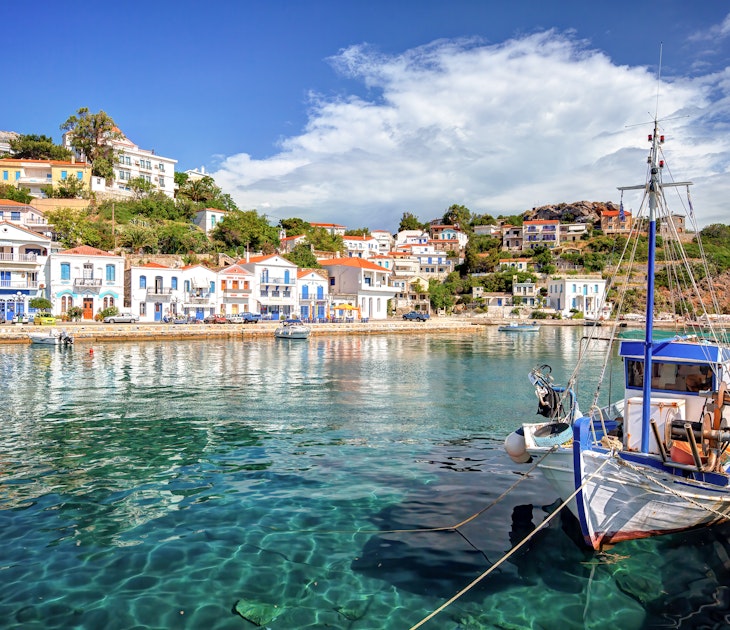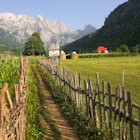

© Sylvain Sonnet/Getty Images
Thanks to some early intervention, Greece was remarkably successful at containing the coronavirus. The country confirmed its first positive case of COVID-19 on February 6, closed schools, theaters, and gyms in early March and entered full lockdown less than two weeks later. By May, things were opening back up –tourists were welcomed back June 15 and international flights recommenced July 1. However, on August 10, Greece confirmed it was in a second wave due to recent spike in infections and introduced new restrictive measures aimed at stabilising the situation.
Editor's note: This story was last updated on August 12, 2020. We will update this piece regularly to stay on top of the latest travel advice.
Travel restrictions in Greece
Only residents of EU and Schengen member states, plus the UK, are allowed entry for non-essential purposes, though exemptions apply for travelers from Australia, Canada, Georgia, Japan, New Zealand, Rwanda, South Korea, Thailand, Tunisia, and Uruguay. Twenty-four hours prior to entry, all visitors must submit a Passenger Locator Form (PLF) detailing their contact information while in country, and on the day of their scheduled arrival, they’ll receive an email with a link to a QR code that must be presented upon screening. Anyone making multiple stops in Greece must declare and report their itinerary for the next 7 days.
As of August 17, travelers arriving from Sweden, Belgium, the Netherlands, Spain and the Czech Republic must present a negative COVID-19 test result taken within 72 hours of travel. The same requirements apply to passengers arriving from Bulgaria, Malta and Romania.
Ferry arrivals are only allowed at ports in Patras, Corfu and Igoumenitsa, and passengers must present a PLF QR code; passengers arriving via yacht have no such restrictions. By land, travelers crossing the Promachonas border with Bulgaria are required to show negative test results. Passengers in transit to a final destination will be permitted to pass through. A maximum of 750 people will be allowed to cross through the Kakavia land border with Albania as of August 16.
Will I have to quarantine when I arrive in Greece?
Any traveler who tests positive on arrival will be contacted and placed on a 14-day quarantine.

Current lockdown status in Greece
Ahead of the return of international tourism on July 1, Greece reopened restaurants, bars, and cafes, with tables spaced one meter apart for outdoor dining and 2 meters apart for indoor. Waitstaff is required to wear a mask, and customers are encouraged to do so as well.
With the recent spike in cases — which officials are blaming on overcrowding in clubs and social events despite new regulations — all bars, restaurants and food-related shops will have to close by midnight in the regions of Crete, East Macedonia, Thrace, and in some regional areas of Thessaloniki, Halkidiki, Larissa and Corfu. Similar rules apply in the municipalities of Mykonos, Paros, Santorini, Volos, Katerini, Rhodes, Antiparos, Zakynthos and Kos. The new curfew will remain in place until August 23.
Hotels and other accommodations, operating under strict health protocols, are accepting guests. Ferry service to the islands has resumed, and social distancing and masks are required in public spaces and on public transit and beaches. Beach umbrellas must be spaced four meters apart.
Many of the country’s famed archaeological sites reopened in May, and museums followed suit in June, both placing limits on the number of visitors allowed at a time.
You might be wondering about...
Athens: In late May, the Acropolis reopened, along with 200 outdoor archaeological sites across the country. The Acropolis Museum is open as well, with masks required and social-distancing expected.
Greek Islands: Greece reopened its 18 regional airports to international arrivals July 1, and travelers arriving on Rhodes, Crete, and elsewhere were welcomed with local sweets and live musical performances. Ferries are reportedly running at 60% capacity, and passengers are required to fill out a health questionnaire and have their temperature taken before boarding. Bars and restaurants on some of the most popular holiday islands are required to close at midnight.
According to USA Today, to prepare for the influx of travelers, “a safety net [has] been built for the islands – with connections to each other and to mainland hospitals for testing and health evacuations. The network of doctors and support staff will be deployed with the help of more than 100 mobile units in cars and speed boats, and backed by the coast guard, air force, and civil authorities. The health ministry will also have 11 futuristic-looking ‘transit capsules’ that can be used for patients heading to intensive care facilities.”
What they’re saying in Greece about COVID-19 and travel
When Greece announced its reopening, officials knew they were taking a chance – but when tourism is responsible for a fifth of the national economy, it seems a chance worth taking. “It’s a calculated risk,” tourism minister Harry Theocharis told Reuters in July. “We do not rush things, we take it one step at a time.”
In June, the Associated Press reported that 99% of the country’s travel revenue dropped during April lockdown, and while some locals might have enjoyed less density on previously crowded beaches and streets, many also missed the seasonal traffic they rely upon to make a living. “Nice as it is, we can't pay our bills with sand," Mykonos resident Stacey Harris-Papaioannou told the BBC.
They could be waiting awhile for that financial rebound. According to one recent study, most people trust that Greece has handled the pandemic appropriately, but only a quarter of the 3,000 people surveyed said they intended to visit before September.
Especially now that officials will be scrambling to break the chain of transmission as infection numbers swell again. Gkikas Magiorkinis, assistant professor of hygiene and epidemiology at Athens university, told the Guardian on August 10 that “Greece has formally entered a second wave of the epidemic. This is the point that we could win or lose the battle”.
COVID-19 snapshot
Explore related stories
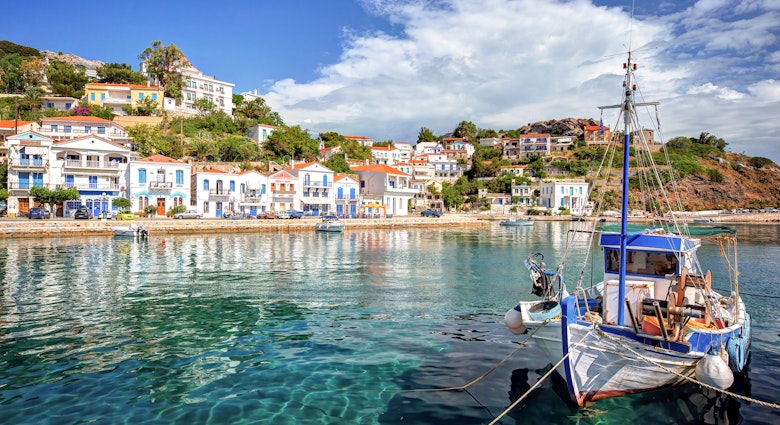




 ShoppingWhat to buy in a Greek supermarket: from tzatziki to oregano chips and more
ShoppingWhat to buy in a Greek supermarket: from tzatziki to oregano chips and moreSep 16, 2024 • 7 min read

